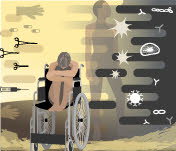
Lessons learned bug
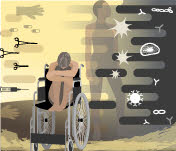
Caroline Mitter was a student at the University of California, Davis, School of Veterinary medicine and a member of the Veterinary Information Network when she was diagnosed in 2014 with a rare chronic disease called mitochondrial cytopathy. The subsequent five years saw her robbed of her ability to finish veterinary school, to walk, to eat, and even to breathe without assistance. However, throughout that time, she trained her own service dog, moderated several Facebook groups and wrote poignantly of life with a chronic illness.
Days before her death in September, Caroline asked a friend to help write a series of essays chronicling lessons learned from her disease. With help from Caroline's father, who was her medical advocate, Christy has drawn from memories and Caroline's own writing to create a four-part commentary. This essay is part of that series.
Farmers Market, Davis, California – anytime 2016-18
We pushed our way through the crowds, two women, a power chair, a golden retriever and a giant basket of produce. Our progress was slow, hindered as much by other people as by the chair, dog and basket.
Caroline shopping 288
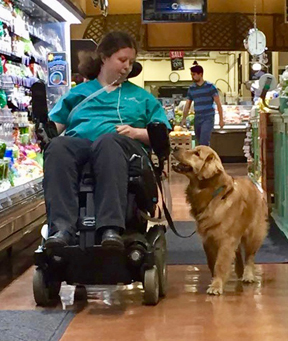
Photo courtesy of the Mitter family
As a service dog, Cricket accompanied Caroline Mitter everywhere. Cricket's cuteness frequently drew intrusive, if well-meaning, attention.
Another young couple stopped us, reaching for Cricket.
"Please don't touch him; he's working," Caroline said from her chair.
"Oh, he's soooooo cute," the woman said, reaching for Cricket.
"Don't pet him; he's working," said Caroline again.
"What's his name?" the man asked me, once again extending his hand toward Cricket's head.
"He is her service dog," I said looking pointedly at Caroline. "And as she said, please don't touch him; he's working."
"Oh." They looked at Caroline, obviously noticing her for the first time. "Sorry about that. He's just so cute. What's his name?"
This scenario played out more times than either of us could have counted over the years — at the Farmer's Market, in the supermarket, at the See's Candies holiday pop-up store.
Ableism, treating a disabled person as if their needs are subordinate to one's own desires, slides quickly from well-meaning to damaging.
Any number of human hospitals, 2016-19
Doctor: So, we're worried about her dosages of pain meds …
Caroline: I have discussed this with my primary care physician and would like to talk with your palliative care team.
Doctor: (looking at Caroline's parents or any other visitor) We're concerned about respiratory suppression …
Pretty much everyone: Caroline can explain her situation best to you ….
It's a minute step from disregarding a disabled person to risking their health. It's also a short step to making access to places and programs nearly impossible.
Dr. Christy Corp-Minamiji 288
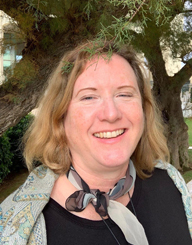
VIN News Service photo
The author, Dr. Christy Corp-Minamiji, met Caroline in 2014, the year Caroline had intended to join the veterinary profession.
Three days before her death, Caroline said: "I want our colleagues and everyone to know: Don't treat people like obstacles. Have some goddamn compassion. For instance, if a deaf client makes an appointment and says they need a sign language interpreter, find them one."
Caroline knew all too well about being treated as an obstacle. She'd had five years of practice, beginning, ironically, in a place designated for educating healers.
Caroline was entering her senior year, her clinical year, at the University of California, Davis, School of Veterinary Medicine when her symptoms first became debilitating. She struggled into clinics but wound up taking a year off in hopes of regaining her strength.
Unfortunately, when Caroline rejoined the class a year behind hers, she encountered an array of obstacles from administration and professors to fellow students.
Her power chair — necessary to support her weakening muscles — was deemed distracting and stressful to patients.
Her ventilator — which made a soft, rhythmic hissing noise — also was deemed a distraction.
Her request to spread her clinical hours out over more days for fewer hours per day was counted unreasonable.
Fellow students declared her requests for accommodations to be "not pulling her weight" and "asking for special treatment."
Despite support from some of her professors and classmates, and despite steadily working through university channels in the hopes of receiving accommodations compliant with the Americans with Disabilities Act, Caroline eventually had to declare defeat. She left veterinary school mere months shy of attaining her goals of graduating and joining the profession in some way, even if she could not practice.
Caroline snuggled 288
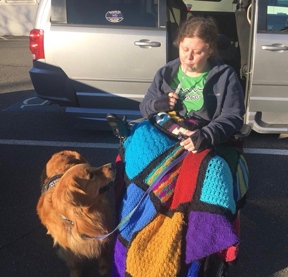
Photo courtesy of the Mitter family
In a picture taken in November 2017, Caroline uses a portable ventilator and is snuggled under a blanket made for her by "yarn fairies" at the Veterinary Information Network, an online community for the profession.
Everyone loves a good disability inspiration story. Yet, when confronted with real-life people who are asking that the world not be made more difficult than it needs to be, we fall short.
There seems to be a perception that when someone with a disability needs an accommodation — a dog, a closer parking space, a sign language interpreter, a ramp, a bathroom stall they can enter and use without assistance, doors they can open, etc. — they are asking for something extra.
Everyone encounters nuisances when navigating the world: traffic, trouble finding parking, landlords who won't take pets. For most of us though, those are inconveniences; they aren't dangerous, life-threatening, activity-limiting or demeaning.
For most of us, breathing comes as naturally as, well, breathing. We aren't criticized, eye-rolled or denied education or work because we need to breathe.
Having to park at the end of the lot on a hot day is uncomfortable, but rarely dangerous for most people. For people with visible or invisible disabilities, an extra 100 yards or even 10 can mean the difference between being able to complete the errand or having to give up, go home and collapse, too exhausted to do anything else that day.
Someone parking too close to my car is a pain, but even post-Thanksgiving, my belly can be squished a bit, and I can wiggle my way out of or into my car. When someone parks in the hash-marked loading zone for a mobility van, they're effectively denying the owner of the van the ability to get in or out — mobility vans have ramps that extend out to accommodate a chair. That's what those painted marks next to accessible parking spaces are for.
Expecting a deaf person's child or even adult family member to translate for them robs them of their agency and disrupts the power dynamics within the family. Lip-reading is imprecise. For some folks, writing or texting will work, but that should be arranged ahead of time.
Caroline Cricket 288
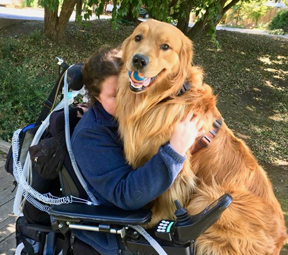
Photo courtesy of the Mitter family
Cricket was trained to climb up on Caroline's chair both to comfort her and to help settle her muscles.
Service dogs/miniature horses are another essay entirely. Suffice it to say, service dogs are not emotional support animals and not therapy animals. Service animals (in the U.S. legally limited to dogs and miniature horses) are trained to perform specific tasks that mitigate the owner's disability. They are considered on a par with medical equipment and are permitted anywhere the owner goes (as long as they don't create a hazard or behave in a manner that is destructive or disruptive.) There is no legal certification in the U.S. for service dogs. An owner-trained dog is just as legitimate as one trained by an organization.
Caroline wrote about the challenges of navigating society with a working dog in the spring of 2019.
I get stopped in the bathroom. In the hallways of hospitals and medical buildings, while I'm trying to find my way to appointments. I get interrupted, often without an 'excuse me,' when I'm talking to friends or even asking a store employee to help me find something — because the stranger's need to touch my personal property is apparently greater than my right as an individual to be treated politely.
I've also had people literally grab objects out of Cricket's mouth as he was retrieving them for me, as if they thought he was a misbehaving dog who was trying to chew something. Yes, he has a soft spot for TP rolls at home, but I'm talking about things like keys or well-sealed grocery products — besides the fact that being in my wheelchair makes it hard to pick things up and there are days when I would literally fall on my face from trying to do so, my tremor makes me more apt to drop things in the first place, and Cricket can also grab some things off the bottom shelf that I can't reach. One guy ran up to us so quickly and started tugging on the object that Cricket startled and wasn't sure what to do and held on for a moment, damaging the box, before letting go because it was clear that the idiot was insistent on preventing my dog from doing his job.
Caroline's anger toward the man in the store may come across as harsh, but this and similar incidences happened to her, and they happen to other disabled people on a regular basis.
Interfering with a working dog, refusing to provide a sign language interpreter, not discussing medical concerns directly with the patient, inappropriately using or blocking disabled parking spaces — these actions may stem from different positions of ignorance, thoughtlessness or even good intention, but they have similar impacts. When we fail to give respect to the systems that help others navigate the world, we are treating each other as obstacles.
Disability awareness comes slowly to most of us not confronted with obstacles in our daily living. Before Caroline, I could easily have been, and may have been, the person interfering with the service dog. Early in our friendship, I'd catch myself trying to "mother" Caroline when she seemed tired or was trying to juggle things. I learned to ask — ask before "helping"; ask what she needed; ask about logistics, including laws. And I started reading more essays and articles. It wasn't Caroline's job as a disabled person to educate me. It was my job to educate myself, apologize when I screwed up and learn to do better.
Ultimately, Caroline's third lesson boils down to, as she said, having some goddamn compassion. The journey through this life is hard enough, and we are all one genetic anomaly, one disease, one bad accident away from a significant disability.
About the author: Dr. Christy Corp-Minamiji is a 1996 graduate of the University of California, Davis, School of Veterinary Medicine. She has practiced small animal medicine and large animal medicine, and worked in the biologics industry. Since 2011, she's worked for the Veterinary Information Network, in communications. Christy and Caroline became friends in 2014. Over the years of their friendship, they shared cupcakes and tea, tears and bad puns, and lots and lots of golden retriever hair. Christy wrote this commentary to honor one of Caroline's final wishes.